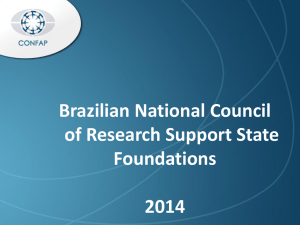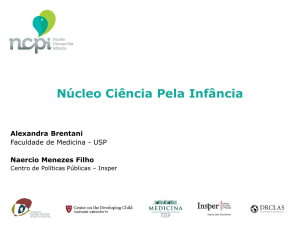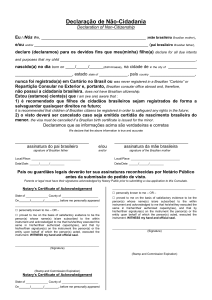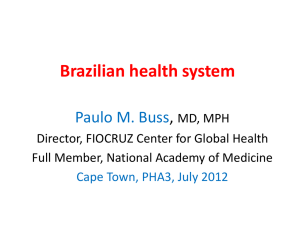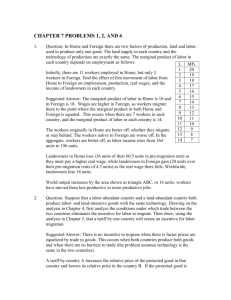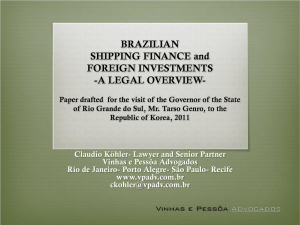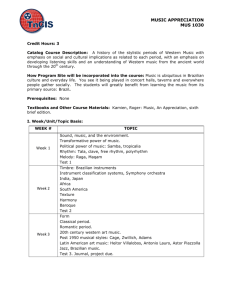Introduction to Brazilian Literature
advertisement
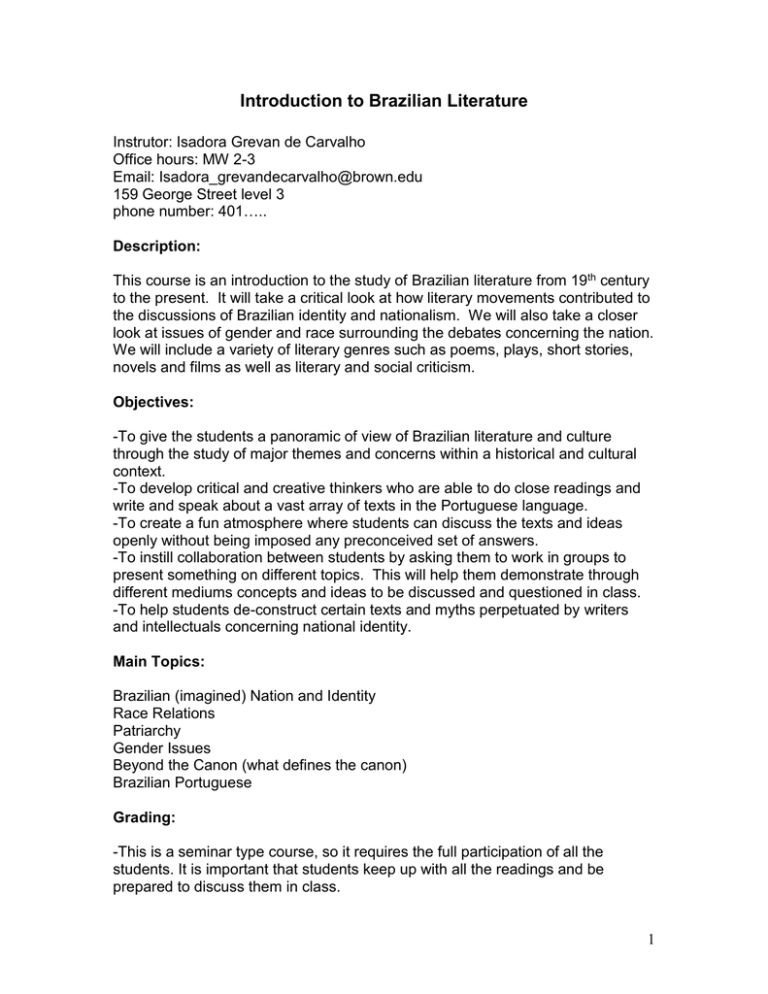
Introduction to Brazilian Literature Instrutor: Isadora Grevan de Carvalho Office hours: MW 2-3 Email: Isadora_grevandecarvalho@brown.edu 159 George Street level 3 phone number: 401….. Description: This course is an introduction to the study of Brazilian literature from 19th century to the present. It will take a critical look at how literary movements contributed to the discussions of Brazilian identity and nationalism. We will also take a closer look at issues of gender and race surrounding the debates concerning the nation. We will include a variety of literary genres such as poems, plays, short stories, novels and films as well as literary and social criticism. Objectives: -To give the students a panoramic of view of Brazilian literature and culture through the study of major themes and concerns within a historical and cultural context. -To develop critical and creative thinkers who are able to do close readings and write and speak about a vast array of texts in the Portuguese language. -To create a fun atmosphere where students can discuss the texts and ideas openly without being imposed any preconceived set of answers. -To instill collaboration between students by asking them to work in groups to present something on different topics. This will help them demonstrate through different mediums concepts and ideas to be discussed and questioned in class. -To help students de-construct certain texts and myths perpetuated by writers and intellectuals concerning national identity. Main Topics: Brazilian (imagined) Nation and Identity Race Relations Patriarchy Gender Issues Beyond the Canon (what defines the canon) Brazilian Portuguese Grading: -This is a seminar type course, so it requires the full participation of all the students. It is important that students keep up with all the readings and be prepared to discuss them in class. 1 -Attendance and punctuality are extremely important. We will not excuse any absences unless it is for an emergency. If abscent for more than 3 classes the student will receive an incomplete for the course. -We expect that all assignments will be handed on time. If not, for each day missed there will be a half letter grade deduction. It will not be accepted if it is more than 2 days late. Group presentations will be assigned throughout the semester. Grade Breakdown: Response Papers (total of 3) - 30% Final Paper (6-8pg) - 25% Final Creative Project -15% In Class presentations – 15% Participation and Attendance – 15% Note about Plagiarism: Plagiarizing is not tolerated. If found plagiarizing….. Materials: -Course Packet and films available at ….. and on mycourses.brown.edu -Required Books to buy available at the bookstore and on reserve at the library: São Bernardo by Graciliano Ramos Sempreviva by Antonio Callado A Hora da Estrela by Clarice Lispector Para Sempre by Ana Maria Machado Parque Industrial by Patrícia Galvão Dom Casmurro by Machado de Assis Recordações do Escrivão Isaías Caminha by Lima Barreto Macunaíma by Mario de Andrade As Três Marias by Rachel de Queiroz O Sortilegio da Cor by Elisa Larkin do Nascimento -Students will also receive a detailed description of the issues to be discussed every week by email/course website including questions to be thought before class. Syllabus January 21: Introduction to the course. Brief historical overview of Brazil’s independence; old pictures of Rio de Janeiro, maps of Brazil. January 23: What makes Brazil, Brazil?: Ufanism, Nativism, Romanticism; Carta de Pero Vaz de Caminha, Gonçalves Dias, Von Martius;Excertpts from Emilia Viotti da Costa’s The Brazilian Empire: Myths and History January 26: Problematics of the national image: José de Alencar’s Iracema. Article by Luiz Fernando Valente. Theme for response paper presented. 2 January 28: Realism: discourse of race, gender and the nation:Lima Barreto’s Recordações do Escrivão Isaías Caminha; excerpts from Thomas Skidmore’s Black into White January 30: Realism II: Machado de Assis: D.Casmurro, Pai Contra a Mãe; Response paper I due and Student Survey February 2: Articles about Machado de Assis; Brazilian society and the debates about betrayal in the novel D. Casmurro February 6: More Machado de Assis: short stories February 9: Modernism: Mario de Andrade Macunaíma (book and movie); Article : O Entre-lugar do Discurso Latino-Americano February 11: Modernist Poetry: Mario Bandeira, Drummond, Oswald de AndradeModernist artists, the modern art week of 1922 February 18: Regionalist Movement: excerpts from Os Sertões, poems by João Cabral de Mello Neto. February 20: João Cabral cont. February 23: Paulo Freyre and João Cabral de Mello Neto. Films. February 25: Regionalist Movement II: Gender Issues: Rachel de Queiroz’s As Três Marias (ch. 1-25);Excerpts from Fitz and Paine’s Ambiguity and Gender….. February 27: cont. of Rachel de Queiroz. March 2: Patriarchal Family: Jose Lins do Rego. Excerpts from Freyre March 4: Jose Lins do Rego. Excerpts from Sergio Buarque de Hollanda’s Raizes do Brasil. March 6: Guimarães Rosa. March 9: Guimarães Rosa. March 11: Gracilian Ramos. March 12: Gracilian Ramos. Theme for response paper presented. March 13: Gender Issues revisited: Pagu’s Parque Industrial. March 16: Parque Industrial. Quinlan and Heloisa Buarque de Hollanda’s articles on Brazilian women writers. March 18: Lygia Fagunde Telles: short stories. Response Paper II due. March 19: Clarice Lispector: short stories. 3 March 20: Lispector: A Hora da Estrela. Interview with Lispector, movie, articles. March 21-March 29 Spring Break March 30: Modernization of Brazilian Theatre: the case of Nelson Rodrigues March 31: Nelson Rodrigues. The Black Experimental Theatre. Films. April 1: Questioning the Myth of Racial Democracy: Abdias do Nascimento. Sortilege and The Sorcery of Color. April 3: Continued Abdias do Nascimento. April 6: Dictatorship and Repression: Antonio Callado’s Sempre Viva (pages 1150) April 8: cont. of Sempre Viva. Film Simonal April 10: Tropicalia Movement. Excerpts from Chris’s Dunn’s book. Sylviano Santiago. Theme for response paper presented. April 13: “Marginal” Poetry: Poems by Chacall, Ana Christina Cesar, Paulo Leminski. Proposal for final paper due and discussed in class. April 15: Questioning Nationality and Identity: Moacys Scliar’s O Centauro no Jardim April 17: cont. of Scliar April 20: Detective Novels: Rubem Fonseca. Response Paper III due. April 22: cont. of Rubem Fonseca April 23: Afro Brazilian contemporary perspectives: Paulo Colina April 24: Afro Brazilian contemporary perspectives: Oswaldo Camargo. April 27: Ana Maria Machado. April 29: Ana Maria Machado. May 1: Marginal Literature: new perspectives? Online articles: Heloisa Buarque de Hollanda. 4 May 4: Creative Projects May 12-Final Paper Due (8-10pp)-Final paper could be a restructuring of your response papers. 5
